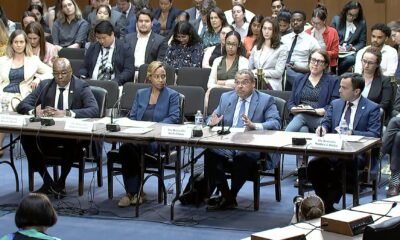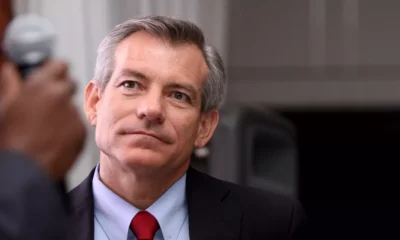coronavirus
Olympians Battle COVID to Compete in Paris as Restrictions Fade

Organizers have issued health recommendations, but no restrictions, for dozens of athletes who have tested positive for COVID during the Paris Olympics.
PARIS, France — The Paris Olympics had been anticipated as a return to normalcy post-pandemic. Contrary to expectations, they have turned into what some are calling the “who cares about COVID” Games.
Noah Lyles secured a bronze medal despite battling the virus, performing in front of thousands of spectators. Dozens of other athletes have also tested positive. Yet, the event’s organizers have only offered health recommendations without imposing any restrictions, allowing athletes to compete if they’re able.
This approach starkly contrasts with the Tokyo Olympics in 2021, which were delayed by a year and held under stringent COVID-19 protocols, including a ban on spectators. Six months later, the Winter Games in Beijing were subjected to even stricter measures due to China’s zero-tolerance policy.
In Paris, the atmosphere has largely returned to pre-pandemic norms. French custom “la bise” has made a comeback. Fans enthusiastically reach out to interact with athletes, and masks are a rare sight. Individuals from around the globe have attended the event without the need for vaccine proof or negative tests.
The World Health Organization reported earlier this week that at least 40 athletes at the Games had tested positive amidst rising global cases.
Noah Lyles was transported off the track in a wheelchair after finishing third in the 200 meters. He disclosed that he had tested positive for COVID two days prior.
British swimmer Adam Peaty tested positive less than 24 hours after claiming a silver medal in swimming. He began feeling ill a day before the 100-meter breaststroke final.
The Australian women’s water polo team reported five COVID-positive players; they were cleared to practice when well enough.
International Olympic Committee President Thomas Bach stated, “COVID is being treated like any other respiratory disease.” He added that the illness is now treated like the flu, with no special measures or notifications required.
COVID is no longer classified as a global health emergency according to the WHO, with higher vaccination levels contributing to lower severity in most cases. Though there’s been a global surge in COVID cases this summer, most incidences are mild unless the individuals are over 65 or have underlying health conditions.
A Paris 2024 spokesperson mentioned that athletes are reminded to follow good practices if they exhibit respiratory symptoms. These include wearing a mask around others, limiting contacts, and regular handwashing. National Olympic committees may implement additional measures.
The Olympic Village has a clinic offering various healthcare services at no cost to athletes.
Back in August 2021, the Tokyo Games took place before global immunization programs were completed. Visitors had to submit daily saliva samples for testing. Any positive results led to immediate isolation, and those with significant symptoms were hospitalized.
In Tokyo, all Olympic participants had to test negative twice before departure and were tested again upon arrival. Dining facilities had stringent measures including plastic screens and gloves were mandatory for picking up food. Fans were not allowed, creating an odd environment with empty stadiums.
The 2022 Winter Games in Beijing were stricter, aligning with China’s zero-COVID policy. A “closed-loop management system” was in place, even for vaccinated personnel. No international fans were allowed, and even Chinese Olympic volunteers had to undergo strict quarantine procedures.
Positive tests led to immediate isolation.
France once had severe COVID restrictions, including lockdowns, an outdoor mask mandate, and a nightly curfew. Last year, the country lifted isolation measures, preferring to recommend basic health practices. This was timely for the 2024 Olympics, labeled the “Games Wide Open.”
Kate Brumback in Paris and Maria Cheng in London contributed to the story.


















